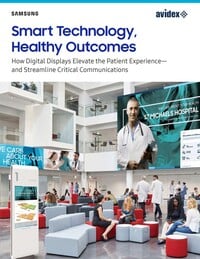
Rockleigh, NJ 07647
United States
Crestron Electronics, Inc.
Model: UC-CX100-PRO-Z

Crestron is going full speed ahead with its sustainability initiatives — and part of that plan includes a partnership with the nonprofit SAVe, Sustainability in AV
April 10, 2024 - In 2015, all 193 member nations of the United Nations unanimously adopted the 2030 Agenda for Sustainable Development — and at the heart of this agenda are the 17 Sustainable Development Goals (SDGs). The goals are broad, including everything from climate action to the eradication of poverty.
At first blush, taking stock of all 17 — and thinking about real-world solutions that achieve those goals — may seem overwhelming. But, as Kitty van der Heijden of the Dutch Ministry of Foreign Affairs stated bluntly in a discussion at Ledin University late last year, “Calling achieving the SDGs by the end of this decade as mission impossible is not an acceptable answer.”
So, what’s a company — or a government or even a single person — to do?
The answer needs to be “whatever we can.”
But where to start?
“MAKING RELIABLE THINGS THAT DON’T BREAK — THAT’S WHAT WE DO,” SAYS CRESTRON’S MIKE ROGERS. “THE LESS STUFF THAT GETS THROWN OUT, THE BETTER.”
Make a Plan
“The first thing you’ve got to do is make a plan,” says Michael Rogers, Crestron’s senior sustainability program specialist. The beginnings of that plan can be informed by things that you’re already doing — and looking at how a company aligns with the SDGs can provide a pretty solid baseline. “We have a code of conduct for our suppliers, for example,” he says. “Are we sourcing materials from businesses that are acting ethically, morally, sustainably — and are taking their own steps to reduce waste? The issue then becomes tracking those suppliers — it’s been a manual process.”
Until now, that is. Crestron has partnered with a software company that tracks a broad variety of metrics, including supplier assessments. “They’re also helping us understand exactly what our carbon footprint is and how we can best reduce it,” says Rogers.
As he’s working through the plan, Rogers is realizing there are more positives baked into the way Crestron does business. “Making reliable things that don’t break — that’s what we do,” he notes, and it’s an excellent illustration of how to help meet the goal of SDG 12: “Responsible consumption and production.” The less stuff that gets thrown out, the better.
SAVe
Crestron has also become a Sustaining Sponsor for SAVe (Sustainability in AV). According to President and Founder Christina De Bono, “SAVe is an all-volunteer, US-based 501c3 organization. Our mission is to bring stakeholders together in the AV industry to do our part in taking concerted action to achieve the 2030 sustainable development goals.” Established in 2022, SAVe just held its first global conference in mid-March to educate and inspire like-minded members of the industry (more on that in a moment).
De Bono has the bona fides: She’s president of the AV integration firm ClearTech, a position she’s held for the last half of her 30-year-long career. Additionally, she says, “I’ve also been involved with community organizations that really are on the front lines of addressing issues of poverty, inequality, environmental, and climate-related issues that disproportionately impact low-income communities.”
De Bono is joined in her mission by SAVe co-founder (and ClearTech CTO) Joe Perez, who has 25-plus years under his belt in the industry. “I'm also on the Emerging Technologies Committee with NSCA (National Systems Contractors Association) as well as their DEI Action Council and their Ignite program, which helps get our youth into the AV industry,” he says.
“DESIGNING WITH LONGEVITY IN MIND IS A KEY CONTRIBUTION TO THE CIRCULAR ECONOMY.” Michael Rodgers, Senior Sustainability Program Specialist, Crestron Electronics, Inc
Curbing E-Waste
The impetus for founding SAVe is the growing awareness that the issue of e-waste — among other aspects of the AV industry — needs to be addressed immediately. “We're going to be generating over 90 million metric tons of e-waste by 2030, the year that we are supposed to achieve the Sustainable Development Goals, and the vast majority of it goes into landfills and dumps. Less than 20% is actually officially recycled,” says De Bono. That’s why one of the core initiatives of SAVe is the SAVe: A Second Life program, which focuses on keeping products out of those landfills. “Is the equipment repairable? Can it be used in another facility, such as a school or nonprofit?” says Perez.
“Additionally, with SAVe: A Second Life, we've also started the SAVe AV Design Committee where we really try to get AV manufacturers, AV consultants, systems engineers, and technicians to implement best practices — down to producing fewer black boxes,” he notes. Some questions Perez offers for corporate self-reflection include: What does the customer actually need? Can you streamline a product to perform multiple functions and create more “all-in-one” solutions so you’re creating fewer total devices? “I think a great example of this kind of thinking is the Crestron DigitalMedia Presentation System Switcher, which reduces the number of components and cabling needed for a solution,” says Perez.
That awareness doesn’t stop at the factory, though. “We’re asking both installers and manufacturers to think about every aspect of a system, to look at everything from heat dissipation, daylight harvesting, configuration of on/off timers for equipment, as well as the number of cables they need,” says Perez. “We’re talking all the way down to the zip ties — if we can find a reusable product for that installation, then that's what we're going to lead with.”
Software and Shipping
Fewer black boxes, of course, mean less packaging. “All of our new products are designed with eco-friendly packaging materials in mind, and plastic use is minimized to the absolute best of our abilities,” says Rogers. “When plastics are the only options, we substitute with environmentally sustainable materials such as recyclable or bio-based plastics and paper.” Crestron also specifies packing materials that are certified, compostable, environmentally sustainable, and made from US-grown corn and ocean-bound plastics.
The downstream effects continue: Fewer boxes mean a need for less space in a container and reducing shipping volume nets a reduction in emissions from transportation. The awareness of energy consumption as a green solution extends to the physical plant, notes Rogers: “We’re committed to the reduction of onsite power consumption by incorporating Crestron’s energy-saving products and solutions into our own facilities.” The strategy includes utilizing natural sources of energy via light harvesting and control features of the Crestron ecosystem.
...
CONTINUED


